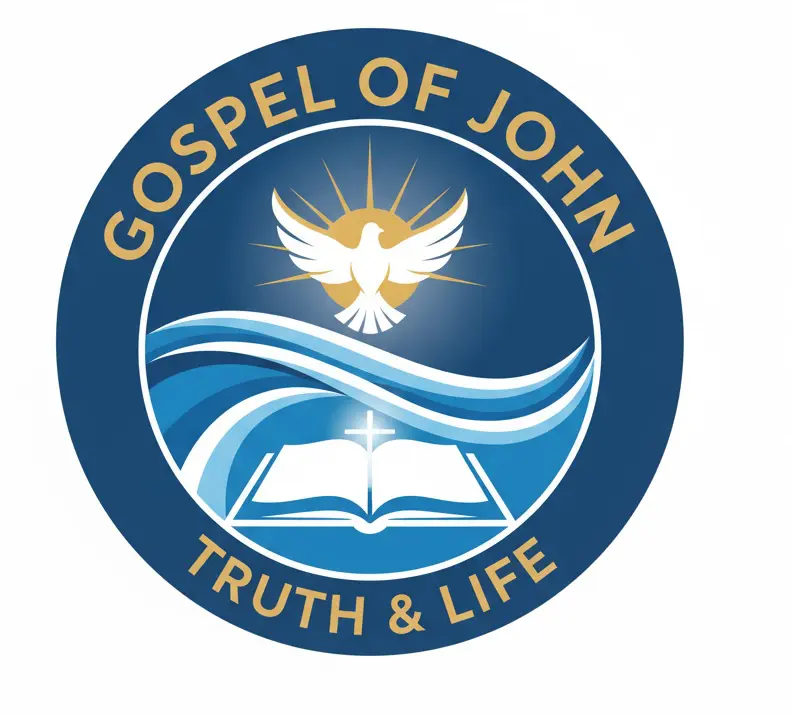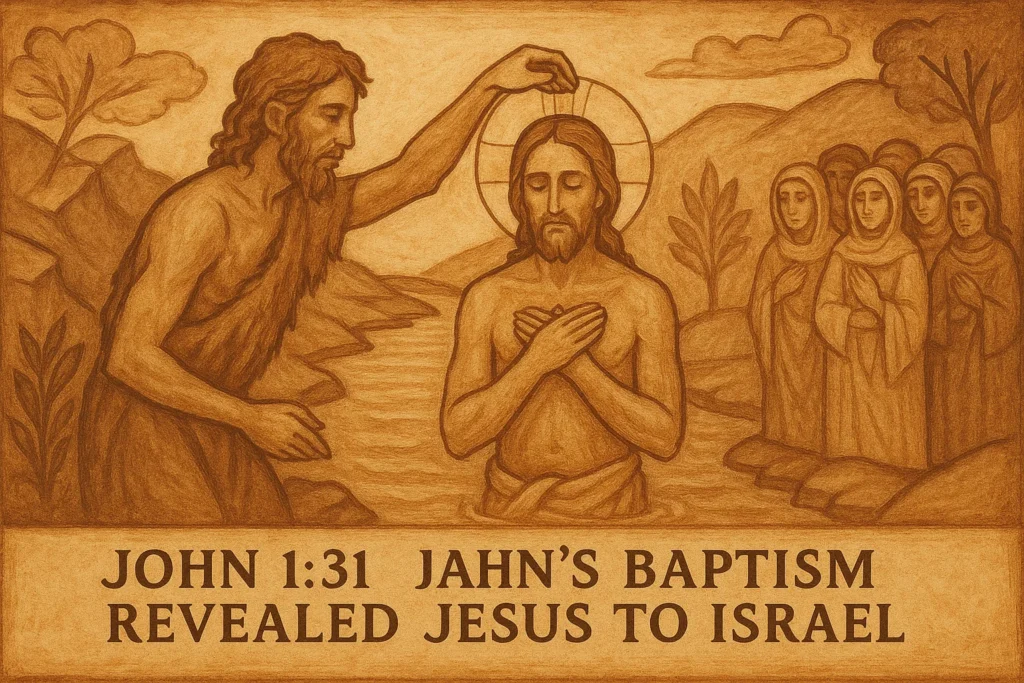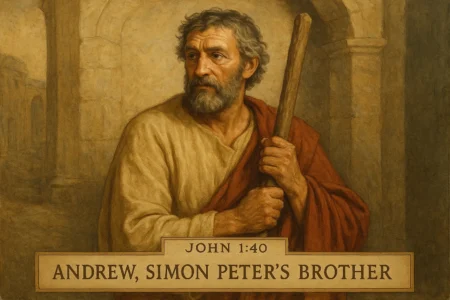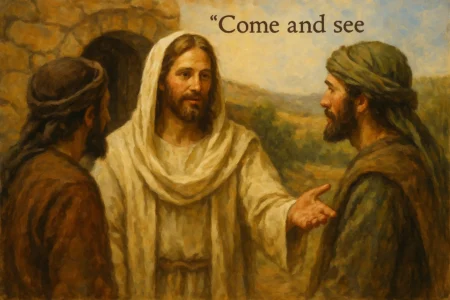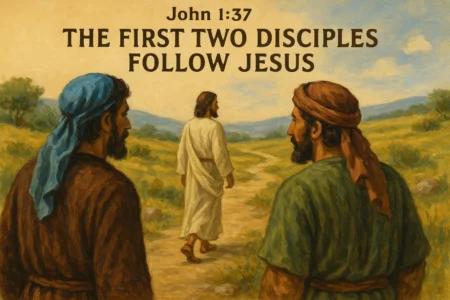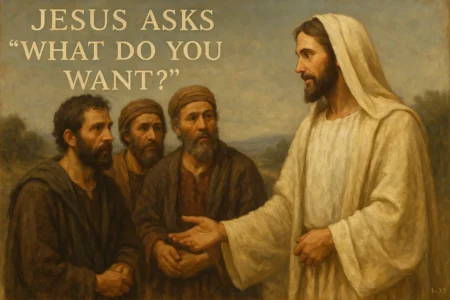I’ve got this one relative. Seen him at family holidays my whole life. Knew his job, knew his favorite team, all of it. Or so I thought. Then one day, I saw him handle a family crisis with this incredible strength and wisdom I never knew he had. It completely changed my picture of him. I knew him, but I didn’t know him.
That’s exactly the vibe I get from John 1:31.
It’s one of those verses that looks simple, right? But it’s not. It’s the key to John the Baptist’s entire life. We see him as the wild man in the desert, preaching fire. And sure, he was. But that wasn’t the point. His mission was razor-sharp. He wasn’t just trying to make people feel bad about their sins. He was setting the stage.
He was the warm-up act for the biggest reveal in history. The John 1:31 meaning is just this: his whole baptism gig? It was God’s chosen plan to officially introduce Jesus Christ to Israel. It was the “coming out party” for the King, and John was the host who didn’t even recognize the guest of honor until the last second.
More in John Chapter 1 Category
Key Takeaways
- John 1:31 in a Nutshell: The verse (“I knew him not: but that he should be made manifest to Israel, therefore am I come baptizing with water”) is John’s whole job description. His water baptism was the event God set up to show Israel who Jesus really was.
- “I Didn’t Know Him”: This doesn’t mean “Hi, nice to meet you, cousin Jesus.” It means, “I didn’t have the divine go-ahead to point Him out.” John was waiting for a supernatural sign, not just a family connection.
- “Show Him to Israel”: This wasn’t a private memo. John’s ministry was a media circus. It pulled in crowds from everywhere. This was the perfect audience for God to unveil the Messiah.
- The Dove Was the Sign: John knew it was Jesus when he saw the Holy Spirit land and stay on Him, like a dove. That was the specific signal God told him to watch for.
- John’s Water vs. Jesus’s Spirit: John’s baptism was like a deep clean (repentance). It got you ready. Jesus’s baptism (with the Holy Spirit) is the real deal—God’s power moving inside you.
So, What’s the Exact Wording of John 1:31?
Alright, let’s pull up the verse. In the King James Version, it’s:
“And I knew him not: but that he should be made manifest to Israel, therefore am I come baptizing with water.”
You gotta break that down. John’s making two massive claims.
First: “And I knew him not.” This is the line that throws everyone. His cousin? Really? We’ll get to that. But the short version? This isn’t “knowing” like you know your mailman. This is “knowing” as in, “I have divine proof.”
Second: “…but that he should be made manifest to Israel, therefore am I come baptizing with water.” That’s his life’s mission statement in one breath. “Made manifest” just means “to be shown” or “revealed.” His whole purpose for being out in the desert wasn’t just a repentance revival. That was part of it. But the main goal was to be the guy on stage who could point to Jesus and say, “There. He’s the One.”
His water baptism was the tool God gave him for the job. It got the people there. It got their hearts soft. And it set the scene for God to do something amazing.
Who Was This Guy Baptizing in the Wilderness?
Look, to get what John was doing, you have to get who he was. This wasn’t some random guy with a new religious idea. John the Baptist was a big deal. Prophecies from centuries before, like from Isaiah, talked about him: “The voice of one crying in the wilderness, Prepare ye the way of the Lord, make his paths straight” (Isaiah 40:3). That was him.
He was the last of the old-school prophets. Think of him as the bridge between the Old Testament and everything that came next. His whole life was a message. That outfit? The camel’s hair, the leather belt? He was intentionally dressing like the prophet Elijah (2 Kings 1:8). The diet of locusts and wild honey? That’s what you eat when you’re 100% out of the system. He was making a statement.
This guy was the definition of counter-culture. He wasn’t in the fancy temples of Jerusalem. He was in the desert—the traditional place of testing and new beginnings. And people flocked to him. Why? Because they were starving for something real. They were living under Roman boots, and their religious leaders felt corrupt or just plain weak. They were desperate for the Messiah. John’s message—”Repent! The kingdom of heaven is at hand!”—hit them right where they lived.
What Made John’s Baptism So Different from Other Washings?
Now, you might be thinking, “Jews already did ritual washing, right?” And you’d be 100% correct. They had mikvahs (ritual baths) for purification. It was a standard part of their religion.
But what John was doing? This was something else entirely. It was revolutionary, and it made people uncomfortable.
- First off, he was baptizing Jews. Ritual washings were often for Gentiles converting to Judaism. John was standing there telling the “children of Abraham” that their bloodline wasn’t a free pass. He was telling them to repent and get clean. That was a radical, offensive idea.
- Second, it was all about repentance. This wasn’t just about being “ritually clean” to go to the Temple. This was a public, personal “I’m done” with sin. It was an outward sign you were turning your life around to get ready for the Messiah.
- And third, it was a one-time deal. You didn’t go get “re-baptized” by John next week. It was a decisive break from your old life.
His baptism was the pre-show. It was the “turn off your cell phones, the main event is about to begin” announcement. It was designed to build a crowd of people whose hearts were ready to receive their King.
“I Knew Him Not” – But Wasn’t That His Cousin?
This, for me, is the absolute core of the John 1:31 meaning. It’s the most fascinating part. The gospels are clear: John’s mom, Elizabeth, and Jesus’s mom, Mary, were relatives (Luke 1:36). John literally leaped in the womb when Mary (pregnant with Jesus) visited! They had to know each other. They were family.
So what on earth did John mean, “I knew him not”?
Here’s how I make sense of it. I’ve got that cousin I mentioned, “Mark.” We grew up together. Played in the dirt, went to barbecues, all that. I knew him. Knew he was a quiet guy, smart, liked video games. Fast forward 20 years. I hear he’s a trauma surgeon. Pretty cool. But it wasn’t until I saw a news story… him, leading this team after a massive highway wreck, saving multiple lives, talking with this calm authority… it just hit me. I knew Mark, my cousin. I had zero clue who Dr. Mark, the life-saving surgeon, was. I didn’t know his real calling.
This is what John is saying, but on a cosmic level. He may have known Jesus the carpenter, his relative from Nazareth. But he did not know—he had no authority to declare—that this was Jesus the Messiah, the Son of God, the Lamb who takes away the sin of the world.
That “knowing” couldn’t come from a family tree. It had to come from God. John was a prophet, and his integrity meant he only said what God told him to say. He was waiting. Waiting for a specific, unmistakable sign.
What Was the “Sign” John Was Waiting For?
So if he wasn’t going to trust his family connections, what was he looking for? John tells us himself, plain as day, in John 1:33:
“And I knew him not: but he that sent me to baptize with water, the same said unto me, Upon whom thou shalt see the Spirit descending, and remaining on him, the same is he which baptizeth with the Holy Ghost.”
Think about that. This is just incredible. John wasn’t freelancing. He was on a direct mission from God. God had told him, “Go baptize. And while you’re doing it, watch. You’re looking for one guy. And here’s how you’ll know him: The Holy Spirit will come down visibly and stay on him.”
This wasn’t a vague hunch. This wasn’t just a “good feeling.” This was a specific, observable, supernatural event he was tasked to look for. Every single person he baptized, every day he stood in that river, he must have been watching, wondering, “Is this the one?”
How Did the Baptism Actually “Reveal” Jesus to Israel?
The scene is just… it’s pure drama. John’s at the Jordan. Crowds are everywhere, buzzing. And then Jesus just walks up. From Galilee. And asks John to baptize him.
You can feel John’s hesitation. Matthew’s gospel says John tried to stop him! “I need to be baptized by you, and you’re coming to me?” (Matthew 3:14). John knew, in his spirit, this man was on another level. He was pure.
But Jesus insists. “Suffer it to be so now: for thus it becometh us to fulfil all righteousness” (Matthew 3:15).
This is so important. Jesus wasn’t getting baptized for his sins. He didn’t have any. He was doing it to “fulfill all righteousness,” which meant He was stepping into the shoes of the people He came to save. He was identifying with us, setting the example, obeying God’s plan, and being officially anointed by the Spirit for His mission. And, for John 1:31, He was doing it because this was the event God had set for the big reveal.
John obeys. He baptizes Jesus. And then… it happens.
As Jesus comes up from the water, the heavens open. The Spirit of God descends visibly, “like a dove,” and comes to rest on Him. And then, the voice of God the Father thunders from heaven: “This is my beloved Son, in whom I am well pleased” (Matthew 3:17).
Can you imagine being John? The sign. The one he’d waited for his whole life. The puzzle piece. That’s Him. His cousin from Nazareth is the Son of God. Now he knew.
This event “made manifest” Jesus to Israel in two ways. First, it revealed Him to John, the nation’s prophet. Second, it gave John the divine authority to become the primary witness to the nation. Which he does the very next day, pointing straight at Jesus and shouting, “Behold the Lamb of God, which taketh away the sin of the world!” (John 1:29).
So, What’s the Deeper John 1:31 Meaning for Israel?
Israel wasn’t just waiting for a messiah; they were waiting for their messiah. And their expectations were… well, they were political. They were crushed under Rome. They wanted a new King David, a warrior who’d kick out the Romans and make Israel great again.
They were expecting a lion.
This is why John’s revelation was so critical. It introduced a completely different kind of Messiah. John’s first public testimony wasn’t “Behold your King!” or “Behold your Conqueror!” It was “Behold the Lamb of God.”
A lamb. An animal of sacrifice. Meek. Lowly. This revelation at the baptism completely shattered their political expectations. It “made manifest” a Savior who came to conquer sin and death, not Rome. His kingdom wasn’t of this world. This was a hard truth for many to swallow, but it was the truth John was born to reveal. The baptism was the official, public kickoff of Jesus’s ministry, the moment He was “given His credentials” from heaven itself.
Why Water? What’s the Big Deal About John’s Baptism vs. Jesus’s?
John says it himself. He makes the distinction crystal clear: “I indeed baptize you with water unto repentance: but he that cometh after me is mightier than I… he shall baptize you with the Holy Ghost, and with fire” (Matthew 3:11).
This is the whole difference. It’s not subtle.
- John’s baptism was external. It was a symbol. A powerful one, sure. But it was you doing something to show you were ready for change.
- Jesus’s baptism is internal. It’s God doing something in you. It’s the “new birth” He talks about. It’s not a symbol of change; it’s the power to change.
The John 1:31 meaning is all tied up in this. John’s water baptism was the perfect stage for the reveal because it was the ultimate act of preparation. It was the nation’s last, desperate cry for cleansing right before the Cleanser Himself showed up.
I think about this distinction a lot. I remember when my wife and I were expecting our first kid. For nine months, we prepared. We painted a room, built a crib, read the books. It was all “water baptism”—all external prep for a thing we couldn’t understand. Then, the moment my son was born and they put him in my arms, everything changed. The “spirit baptism” of fatherhood hit me. The love, the terror, the responsibility—it wasn’t a symbol. It was real. It was in me. John’s ministry was the prep. Jesus was the reality.
So Did John Just… Retire After That?
This is where John’s character just floors me. His humility is unreal.
His entire life’s purpose? Fulfilled. Right there at the Jordan. He’d done it. He’d prepared the way. He’d pointed out the Lamb. So what’s he do? Try to keep his ministry going? Complain his followers were leaving?
No. He gives us one of the most famous lines ever: “He must increase, but I must decrease” (John 3:30).
John got it. He was the best man, not the groom. He was the signpost, not the destination. His joy was full seeing Jesus take the spotlight. After that reveal, his mission changed. He kept preaching, but his main job was just to point. When his own disciples started following Jesus, John’s response was basically, “Good. That’s the whole point.”
His ministry would end in a dark prison, his head taken by a petty king. But it didn’t matter. His one, defining purpose—the one from John 1:31—was complete. He had made Jesus “manifest to Israel.”
What Can We Take Away from John 1:31 Today?
It’s a powerful reminder about purpose and preparation. John’s whole life was prep for one job. It reminds us that our “wilderness” seasons, where we feel like we’re going nowhere, might just be God’s prep for the main event.
It also screams humility. John’s life is the ultimate answer to our “look at me” world. He was the most famous guy in the country, and he stepped back on purpose. It’s a gut check: is my life about building my platform or about making Jesus “manifest” to others?
And finally, it shows us we need divine revelation. John, the great prophet, couldn’t see it on his own. He needed the Spirit. We’re the same. We can’t “figure out” God. We need Him to reveal Himself to us, which He does through His Word and His Spirit. For a deeper dive on the history of Jesus’s baptism, Boston University’s article on the subject is a great read.
But Wait, Why Did Jesus, Being Sinless, Even Need Baptism?
This question always comes up, and it’s a good one. It was John’s first question! The answer, “to fulfill all righteousness,” is just so deep.
Think of it like this: Jesus came to be our perfect representative. He had to step into our shoes. To “fulfill all righteousness” meant He had to perfectly walk out God’s plan. And God’s plan, at that moment, was for the repentant to be baptized by John. For Jesus to be their leader, He had to walk that path with them.
He didn’t get a “pass” on the human experience (except for sin). He was identifying with us. He stepped into the waters of repentance not for Himself, but for us. He was publicly kicking off His mission to stand in the place of sinners. His baptism wasn’t the end of His identification with us; it was the beginning. It was the first public step on the road that would end at the cross.
His baptism was His public “I’m all in” for the rescue mission of humanity.
The Baptism That Changed Everything
When you circle back to John 1:31, the verse just snaps into focus. It’s the key to the whole thing.
Without this verse, John’s baptism is just a big, powerful revival. It’s incomplete.
With this verse, John’s baptism becomes the moment. The divinely set-up launch party for the Son of God. It’s the hinge on which history turns. Every sermon, every person going under the water… it was all the drumroll for the King.
The John 1:31 meaning is that God has a plan. He had a specific man (John), a specific mission (water baptism), and a specific purpose: to “make manifest” His Son, Jesus, to Israel. And in doing so, to the whole world. It was the moment the Messiah stepped out of the carpenter’s shop and onto the world stage, right on cue.
FAQ
Why did John say ‘I knew him not’ if he was related to Jesus?
John’s statement ‘I knew him not’ signifies that he did not have divine authority or revelation to identify Jesus as the Messiah until God confirmed it through the sign of the Spirit descending and remaining on Jesus.
What was the significance of the sign John was waiting for during Jesus’ baptism?
John was waiting for a supernatural sign from God, specifically to see the Holy Spirit descending and remaining on Jesus, which confirmed Jesus as the Son of God and the one who baptizes with the Holy Spirit.
How did Jesus’ baptism reveal His identity and mission?
Jesus’ baptism revealed His identity through the visible descent of the Holy Spirit and God’s voice declaring Him as His beloved Son, and it signified His willingness to identify with humanity and begin His public mission.
What is the difference between John’s water baptism and Jesus’ Spirit baptism?
John’s water baptism was an external symbol of repentance and preparation for the Messiah, while Jesus’ Spirit baptism is internal, involving God’s power working within a person, leading to spiritual renewal and new birth.
